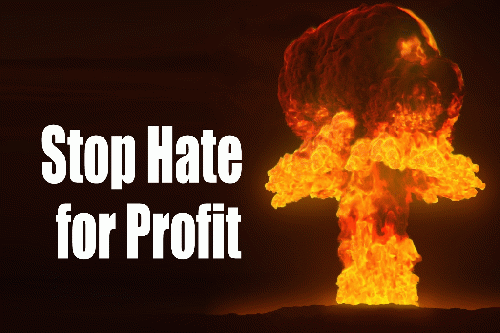Agitated online protesters are now scoring remarkable victories. They're tearing at a monument they believe symbolizes the proliferation of hate. It's not a physical edifice. It is Facebook, the social-media giant. That's their target. They singled it out due to its policy of allowing rhetoric that many believe promotes hate on its platform.
This protest movement goes by the hashtag #StopHateForProfit. Its tactic is to implore responsible companies to boycott Facebook as an advertising venue. The group has scored big successes. Major advertisers are pulling back their Facebook ads.
But Facebook has no monopoly on hate for profit.
There's more hate out there. The media stream is replete with stories that seem aimed at promoting one variety of hate or another.
Now that the #StopHateForProfit approach has proved its effectiveness against Facebook, should the concept stop there? Hate is hate wherever it is found. Hate is hate no matter what its target. And hate is hate irrespective of its form of expression.
The initial #StopHateForProfit actions are in opposition to hate speech. One organization active in the movement defines its actions as "a campaign to make bigotry and sexism less profitable".
A thoroughgoing analysis will show, however, that speech alone is not the underlying problem. In 1862 the African Methodist Episcopal Church reportedly published the adage, "Sticks and stones may break my bones, but words will never break me." That makes the point. Surely we must look beneath the words. They're just the visible artifacts of a larger problem.
The ultimate target must be to stop the disrespecting of people and disregarding the conditions they need to pursue a good life.
Often that disrespect can be much more insidious than mere speech. Disrespecting the environment for profit, for example, can be seen as a form of ultimate hate. Its impact can be felt universally. But yet there are large companies that are engaged in this kind of disrespect. However they are not being targeted.
An organization called Sleeping Financial Giants has articulated this issue well. It produced a report that reveals "links between the financial sector and climate change". It came to that finding by "examining how financial actors [are influencing] global systemic risks related to climate". The report adds that there is "a moral imperative for global economic actors to conduct business and investment so as to not undermine the capacity of future generations to inhabit Earth".
Embedded in the Sleeping Financial Giants' report is the concept of a "tipping point" in social discourse. It is a point past which there is no return. One characteristic of this is that a single event alone can push things past the tipping point.
In 2020 we have reached a tipping point in race relations. The police murder of George Floyd clearly pushed us to it. While there is still much to be done about race, it seems unlikely that things will ever regress to the earlier conditions. What happened represents a change that has been socially valuable. A tipping point in climate change, on the other hand, could herald the advent of global disaster. It is that kind of transition we must guard against.
Another hate issue surrounds the threat of nuclear catastrophe. It presents itself as perhaps the most consequential tipping point ever. This isn't an issue that is as obvious as racial tensions. It is not a problem like rising temperatures and melting glacial ice that you can actually see. It is more like the problem of radon gas in homes. You can't see it or smell it. But it is still there and is a danger to human life.
The hate-bating here involves the US-Russia relationship. The United States and Russia both maintain stockpiles of nuclear weapons with enormous destructive potential. Some say if unleashed they could lead to the destruction of human civilization as we know it. In the words of Andrew Lloyd Weber's song, appropriately titled "The Point of No Return", it could be "the final threshold".
If for no other reason than the destructive capabilities of the two countries a greater modicum of mutual respect is essential. The risk in play is too great to do otherwise.
(Note: You can view every article as one long page if you sign up as an Advocate Member, or higher).






